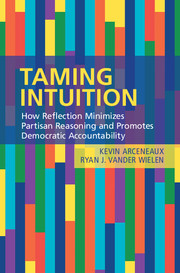Book contents
- Frontmatter
- Contents
- List of Figures
- List of Tables
- Preface and Acknowledgments
- 1 Democratic Accountability and the “Rational” Citizen
- 2 A Theory of Individual Differences in Reflection and the Intuitionist Model of Political Reasoning
- 3 Measuring Individual Differences in Reflection
- 4 Toeing the Line: Partisan Identities and Policy Attitudes
- 5 Throwing the Rascals Out: Partisan Identities and Political Evaluations
- 6 Can't We Disagree without Being Disagreeable? The Role of Reflection in a Polarized Polity
- 7 Reflections on the Role of Reflection in Democracies
- Appendix Details of Empirical Studies and Statistical Analyses\
- Notes
- References
- Index
1 - Democratic Accountability and the “Rational” Citizen
Published online by Cambridge University Press: 30 August 2017
- Frontmatter
- Contents
- List of Figures
- List of Tables
- Preface and Acknowledgments
- 1 Democratic Accountability and the “Rational” Citizen
- 2 A Theory of Individual Differences in Reflection and the Intuitionist Model of Political Reasoning
- 3 Measuring Individual Differences in Reflection
- 4 Toeing the Line: Partisan Identities and Policy Attitudes
- 5 Throwing the Rascals Out: Partisan Identities and Political Evaluations
- 6 Can't We Disagree without Being Disagreeable? The Role of Reflection in a Polarized Polity
- 7 Reflections on the Role of Reflection in Democracies
- Appendix Details of Empirical Studies and Statistical Analyses\
- Notes
- References
- Index
Summary
Democracy is the theory that the common people know what they want, and deserve to get it good and hard.
– Henry Louis Mencken (1916, 19)For all of its praise as an ideal form of government, democracy provokes a lot of scorn in practice. In its pure and ideal form, democracy is premised on a simple idea: the people govern themselves. Enshrined in this idea is the principle that socially binding decisions should reflect the will of the people. In the United States and most other advanced industrial societies, rule by the people is a widely accepted, uncontroversial political creed. It is an idea so fundamental and self-evident that democracy, at least in the abstract is as much a virtue as kindness or patience. Like so many other things, however, what seems great in the abstract is usually less so in practice. As Henry LouisMencken's wry opening quote illustrates, despite democracy's broad appeal, there is a great deal of pessimism surrounding the notion that people are actually capable of self-government.
Much of this pessimism derives from the translation of democratic ideals into real-world institutions. In its ideal form, democracy achieves rule by the people quite simply by giving all the adult citizens in a society the right to vote directly on matters of public policy. Seen as unwieldy if not impossible to re-create in large-scale societies, the democratic governments that took shape in the nineteenth century relied on republican institutions in which a smaller group of individuals chosen through election would make decisions on behalf of the people. Republican institutions generate democratic outcomes insofar as elected policy makers make decisions that faithfully represent the wishes of the constituents who elected them. Benjamin Franklin (2003/1787, 398) offered a succinct explanation of the people's role in an electoral democracy during the convention that drafted the US Constitution and created the first modern electoral democracy. He said, “In free governments, the rulers are the servants and the people their superiors and sovereigns.” Restated in academic parlance, Franklin's view of electoral democracy designates the people as the “principals” and their elected representatives as their “agents.” The principal-agent arrangement is a common element of industrialized societies where people must rely on others to accomplish their tasks.
- Type
- Chapter
- Information
- Taming IntuitionHow Reflection Minimizes Partisan Reasoning and Promotes Democratic Accountability, pp. 1 - 17Publisher: Cambridge University PressPrint publication year: 2017



